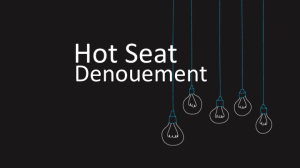Hot Seat #78 Denouement: 5yo F with fever and AMS
Posted on: August 25, 2016, by : Evan Sherman
Jamie Martin, Children’s National Medical Center
with Desiree Seeyave, Children’s National Medical Center
The Case
5yo F presented with fever and AMS, and was ultimately found to have meningitis. This case turned into a discussion on risk tolerance in the face of a “mild” case of meningitis.
Here’s How You Answered Our Questions
As we often see in our polls, our fellows and young attendings preferred to treat more aggressively, as opposed to our more experienced faculty.
Denouement:
The patient was admitted to the Neurology service. She was started on empiric ceftriaxone and acyclovir. Vancomycin was deferred as there was very low concern for ceftriaxone-resistant S. pneumoniae meningitis. She was noted to have continued fear/refusal to walk at inpatient H&P. Normal neurological exam and behavior were also noted. ID was consulted due to concern for encephalitis vs meningitis, noting that the LP results were more concerning for a viral etiology. ID recommended a CSF viral encephalitis panel including tests for Mycoplasma, West Nile, CMV, EBV, and Arbovirus, as well as corresponding serum studies.
The patient continued to remain sleepy, so an MRI was performed, which showed areas of enhancement in the cerebellum suggestive of cerebellitis/rhomboencephalitis. Serum studies were remarkable for highly elevated Mycoplasma IgM and IgG, suggesting Mycoplasma CNS infection as the cause of her altered mental status. She was started on azithromycin, after which the she improved clinically. She was discharged home and instructed to follow up with PM&R.
Discussion:
Desiree Seeyave, our teaching attending for the week, and Jennifer Chapman both posted excellent comments outlining their thoughts on the differential and next steps for this patient.
In addition, Pavan Zaveri shared some particularly timely advice for new fellows, who may be discovering that there is often no standardized approach to treating some of the common diagnoses we see in the ED.
The patient in this case wound up with a relatively rare diagnosis of Mycoplasma pneumoniae CNS infection (which, incidentally, would not be effectively treated by any of the initial antimicrobials being considered). According to Uptodate:
CNS manifestations occur in approximately 0.1 percent of all patients with M. pneumoniae infections and in as many as 7 percent of patients requiring hospitalization. CNS involvement occurs most frequently in children and includes aseptic meningitis, meningoencephalitis (which may be complicated by postencephalitic epilepsy), peripheral neuropathy, transverse myelitis, cranial nerve palsies, and cerebellar ataxia. […] The pathogenesis of the CNS disease is uncertain. Possibilities include direct infection and an immune-mediated reaction.
Although uncommon, CNS involvement is associated with significant morbidity and mortality. One study evaluated 61 individuals with neurologic disease attributed to M. pneumoniae and found that five (8 percent) patients died and 14 (23 percent) had severe sequelae. […]
Treatment of M. pneumoniae CNS disease is individualized according to the clinical syndrome and severity of illness. Antibiotics are frequently administered given concern for long-term neurologic sequelae. However, randomized trials evaluating antimicrobial and/or adjunctive therapies for M. pneumoniae CNS disease are lacking. […]
The pathogenesis of M. pneumoniae CNS disease is poorly understood. Possible mechanisms include direct invasion, immune mediation, and neurotoxicity. Antibiotics would not be expected to have a major therapeutic role in immune mediated or neurotoxic disease. In observational studies, glucocorticoids, antiinflammatory drugs, diuretics, and plasma exchange have been used in addition to antibiotics without clear indication of benefit.
In a retrospective analysis of 42 children with definite, probable, or possible M. pneumoniae CNS disease (eg, encephalitis, transverse myelitis, acute disseminated encephalomyelitis, etc), 29 children received macrolide therapy, and 17 received glucocorticoids. Adverse neurologic outcome (eg, epilepsy, focal neurologic deficit) occurred in 15 of those who received macrolides and 9 of those who received glucocorticoids. […]
